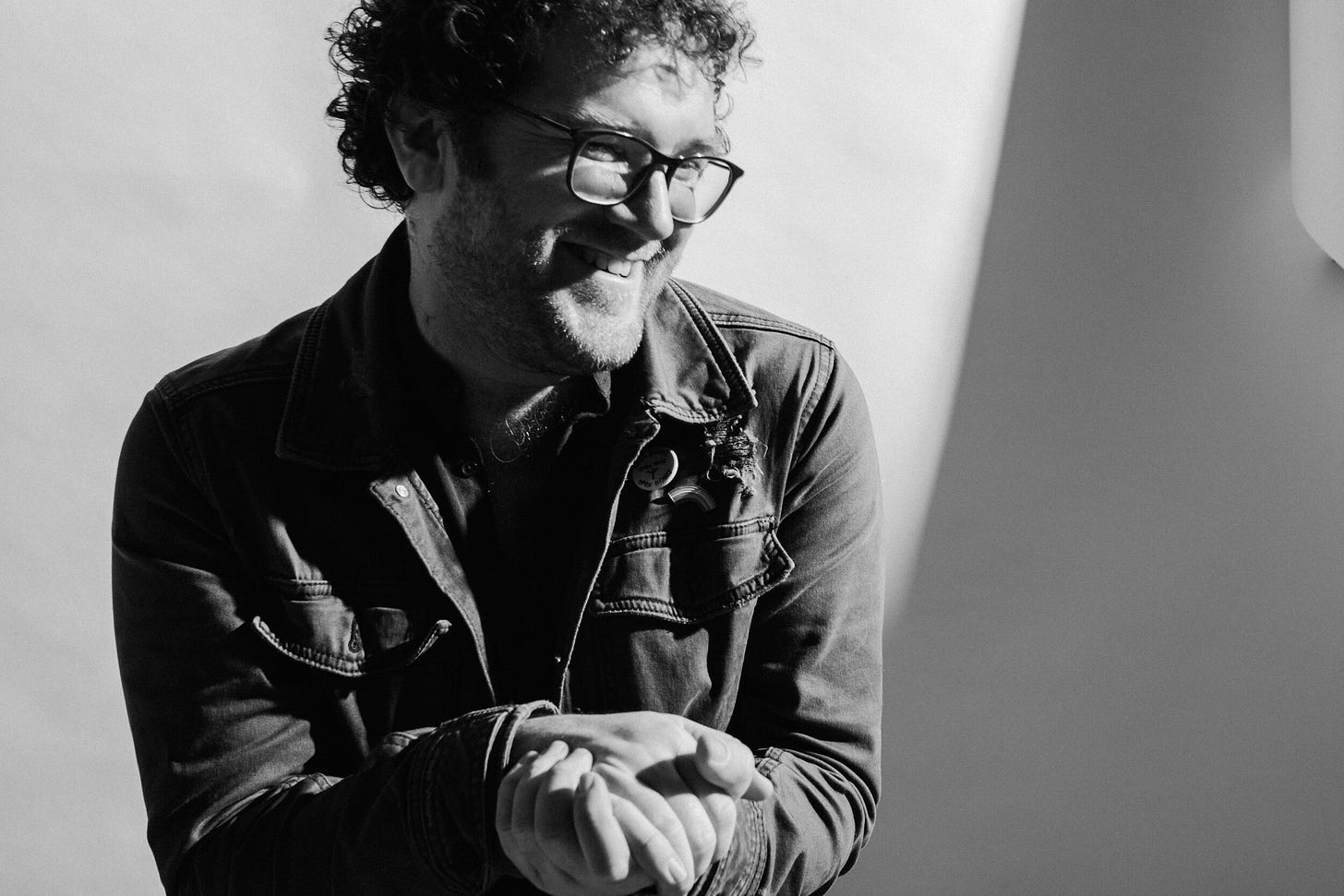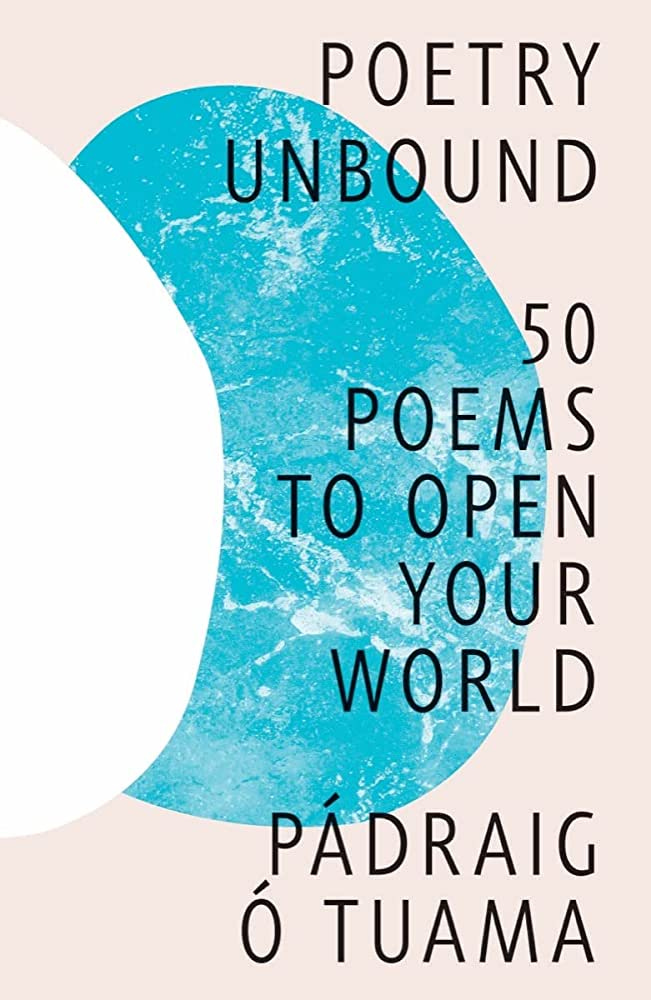'A poem lands in our bodies'
5 questions for poet, podcast host, and peacemaker Pádraig Ó Tuama
I feel like Pádraig Ó Tuama and I are cousins, part of a strange and wonderful family that extends out from the On Being universe—our mother mystic, of course, being Krista Tippett. (I wrote a column for On Being for many years and was interviewed alongside my mentor Parker Palmer.) So it was with great delight and curiosity that I picked up Pádraig’s new book, Poetry Unbound: 50 Poems to Open Up Your World. In it, Pádraig curates 50 poems by other people, and then positions them alongside a reflection essay of his own, layering on stories, interpretation, questions, and quandries. It’s nourishing from start to finish. Whether I was re-reading a familiar favorite (like Dilruba Ahmed’s “Phase One”) or meeting a new poem, even with some resistance of one kind or another, I was enriched. I couldn’t wait to catch up with Pádraig and ask him about the work (which grew out of his wonderful podcast of the same name). Check it out…
Courtney Martin: I spent the holiday break reading three poems and your teaching of them each day and it was so grounding and enlivening. How do you hope people read this book? Is there a particular cadence or order you were imagining? And what are you hearing from folks about how they're using it?
Pádraig Ó Tuama: Often, when I read a poetry journal, I start at the back. I don’t know why I do this. Something to do with obligation and homework, and a sense that I always want to find my own way into a publication. I’m the same with newspapers. And I rarely start a recipe in the place I’m told to start. And I always add more garlic.
So, I hope that people read Poetry Unbound in the way they want. Perhaps they’ll look at the table of contents and just go with the poems whose titles intrigue or irritate them. Perhaps they’ll start at the end. Or open at random. Or go to what their friend said they’d like.
Some people have been writing to me saying they’ve read one a day over coffee, or on the train. Others have started reading one a week, like some kind of Sunday reflection. Still others have formed little zoom groups and discuss their own lives in conversation with the poem. And still others have taken the poems into hospital rooms where conversation seems stilted. They’ve let the rich language of the poems be in the space where language often feels like it fails. “Memory is born of sensuous experience” the group psychoanalyst Wilfred Bion said, and I think a poem lands in our bodies in that way; as an experience, to be felt, and remembered in the senses.
Whenever anyone comes up after a reading, and says they’ve liked the book, I ask them why. I ask them that not because they’re going to tell me how lovely I am, but because — without fail — they tell me a story from their lives. Suddenly I hear the poem’s work continuing to work. It has gone into the life of a reader and is making itself more by being made more by that reader.
You seem like such a natural teacher. Were you one of those little kids who taught your own imaginary classroom? Where do you see the seeds of your teaching self?
That’s an interesting observation. And no, I never taught an imaginary classroom. I had too much violence to contend with to wonder about the small violences of the classroom. Ha! I wish that weren’t true. I mostly played at priest, placating God into quiet in between sacrifices.
I do like education, though. Years ago I did a course on adult education in Australia. One of the things it drilled into me was that a roomful of adults have an amassed knowledge that must be respected and acknowledged. Education is not about communicating information to uninformed people (whether they are adults or not). Education is about sharing the experience of learning together. Someone will know more than someone else, and sometimes that’s the teacher. But not always. I like the shared discovery.
I loved the blend of “personal” and “political” in this book--though I even hesitate to differentiate them at all because everything is both. How do you think about those two categories when you are reading and curating poems? Did anyone on the editorial side worry there were too many “political poems” here for general audiences?
This is where I’m very Irish. For us, growing up, there was no delineation between the personal and political poem. Learning a poem off by heart in the Irish language is, in itself, a political act; whether that poem is about a cow, a midlife crisis, or a field.
To write in a language that has been the subject of colonial policy is always a political act. Nuala Ní Dhomhnaill, a former Ireland Professor of Poetry said something like “I live in the knowledge that I write in a language that might very well be dead before I am.”
I arrived in primary school speaking two languages, and confused as to why the language of the country wasn’t the language everyone spoke all the time. Some of the revolutionaries that fought for Irish independence (granted partially in 1921) were poets. They were executed within a few days. Our current President Michael D. Higgins is a poet too. I see that the political poems of the Poetry Unbound book are explorations of beauty and relationally, and I see that the interpersonal poems are also political poems.
Take the category of “Nature Poetry” for instance. Isn’t war part of human nature, whether we like it or not? Haven’t we made it part of human nature? What might it mean to have gardens and guns in the same sentence. Ross Gay’s “A Catalog of Unabashed Gratitude” goes from orchards to awfulness and back on the same page. It’s never occurred to me that something has to be one or the other. The folks at Canongate — who were the primary editors of the book, along with Jill Bialosky at Norton — understood this as part of the approach I take to poetry, and we had rich exchanges about how to use levity and gravity, whether the poem was about war or wonder.
What poem would you want read at your funeral and why?
Today, I’d say “Having Confessed” by Patrick Kavanagh. Kavanagh is my first love in poetry, and that poem contains the lines “Lie at the heart of the emotion. Time / Has its own work to do.”
And why? Because whatever God is, is also something that Time is. These days I find the language about the nature of religion or the nature of time too complicated to comprehend. But I like the language of experience. So I love the instruction of Kavanagh’s to lie in the experience. And to let whatever time is do whatever time does. This is the way in grief, and the way in change.
You are a poet yourself. If you could pick one person to “teach” a poem of yours the way you do for so many others, who would it be and what poem would you want them to “teach?”
My first — and probably permanent — answer to this is Marie Howe. I’ve got some new poems set in the Garden of Eden and I’d enjoy hearing what Marie would say about them, notably because the poems I write about Eden are not the poems she’d write about Eden. There’s a disconnect there, and it’s in that hinge that I think something interesting could emerge for whomever’d be listening to what Marie would teach.
She’s a wondrous teacher, someone who inhabits a poem, breathes it, and invites people to find their own conversation with the craft, content, message, unconscious and unstated of a poem.
Buy Poetry Unbound here. We collectively donated to In-Na-Po—Indigenous Nations Poets—a national Indigenous poetry community—in honor of Pádraig’s labor. Feel free to pile on!







Poetry Unbound is absolutely brilliant! It connects me with my own Irish ancestry and I’d like a whole selection from it read at my funeral.
Thanks so much for this inspiring interview.
DD
Inspired by this post, I had a poem with my coffee today.